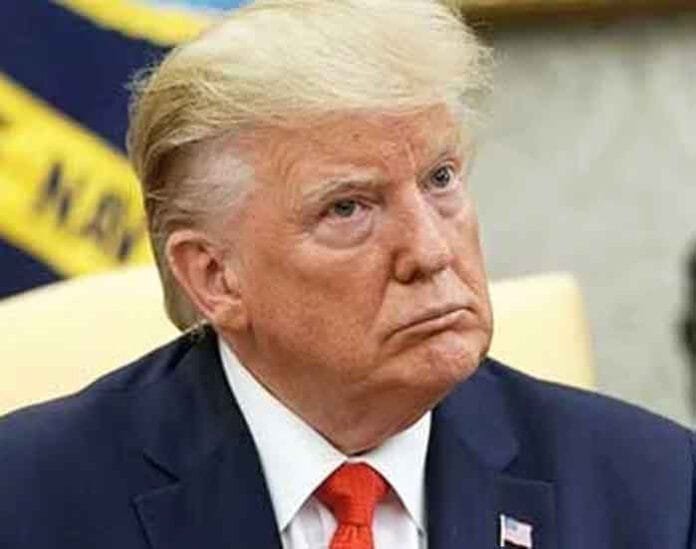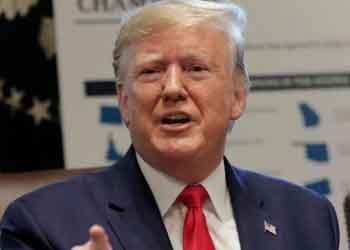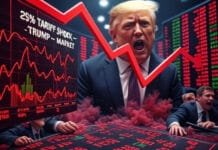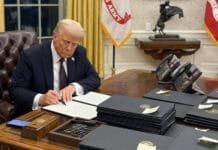INVC NEWS Washington – In a bold and controversial move, former U.S. President Donald Trump has announced plans to impose a 100% tariff on all non-American films entering the United States. His justification? Hollywood is collapsing under the weight of foreign competition, and this policy, he claims, is an essential step toward revitalizing the American film industry and protecting national identity.
Trump’s Tariff Blitz Targets Global Cinema
In a recent statement that has stirred shockwaves across the global entertainment industry, Trump called for an immediate and aggressive tariff on all films made outside the United States. According to Trump, the surge of foreign-produced content has significantly undermined Hollywood’s influence and revenue, attributing it to an orchestrated international effort to weaken American cultural dominance.
“Hollywood is dying. It’s not just business—it’s propaganda. Other countries are funding their film industries to overtake ours, and we’re letting it happen,” Trump declared.
With these comments, Trump issued a directive to the U.S. Department of Commerce and the Office of the United States Trade Representative (USTR) to begin implementing a 100% tariff on all foreign-made films—whether produced by non-U.S. studios or shot outside American soil by U.S.-based companies.
National Security and Cultural Sovereignty: Trump’s Justification
Trump emphasized that the decline of Hollywood is not only an economic concern but a national security issue. He argued that foreign films often carry messaging that challenges American values, and the widespread distribution of such content amounts to international propaganda.
“This isn’t just about box office numbers. This is about who controls the narrative. It’s about our people, our future, and our sovereignty,” he said.
According to Trump, other countries offer massive tax incentives and subsidies to lure American filmmakers abroad, leading to job losses in the U.S. film industry and a shift in storytelling power. The new tariff policy aims to penalize these advantages and encourage producers to return to American studios and locations.
Hollywood Reacts: Divided Industry, Rising Tensions
The announcement has generated intense reactions across the American film industry. While some conservative filmmakers have praised the move as a necessary act of cultural preservation, many leading producers, directors, and international partners have condemned the tariffs as regressive and damaging.
Industry insiders fear that such a steep tariff could result in:
A sharp decline in international collaboration
Limited distribution of foreign award-winning cinema
Higher production costs for American studios shooting overseas
A cultural backlash from global audiences
Independent filmmaker Alyssa Harding said, “This kind of protectionism doesn’t help artists—it isolates them. American cinema thrives on diversity, collaboration, and freedom, not fear.”
Commerce Secretary Howard Lutnick: “We’re Moving Forward Swiftly”
U.S. Commerce Secretary Howard Lutnick confirmed that the administration is already drafting the necessary policy frameworks to enact the tariff. While he refrained from providing a definitive timeline, Lutnick assured that this is a top priority for the administration.
“We’re actively reviewing how this will be implemented. Our goal is to protect American creative industries while complying with international trade obligations as much as possible.”
However, questions remain about the scope and execution of the tariff. Will it apply to films shot abroad by U.S. companies? Will streaming platforms also be subject to the duty? Will foreign-language films be banned outright, or simply taxed into obscurity?
Global Fallout: Diplomatic Concerns Mount
The proposed tariff has sparked concern and criticism from international partners. Countries with thriving film industries—such as India, South Korea, France, and China—have accused the U.S. of economic censorship and cultural imperialism.
Film industry representatives from several European nations jointly issued a statement:
“Art is universal. Restricting films based on their origin undermines the shared language of cinema and threatens global artistic freedom.”
Many trade experts also caution that this move could trigger retaliatory tariffs from affected nations, possibly targeting American streaming services like Netflix, Amazon Prime Video, and Disney+.
April’s Chain of Tariffs: A Pattern Emerges
This announcement is part of a broader escalation in Trump’s global tariff strategy. On April 2, Trump imposed wide-reaching reciprocal tariffs on key trade partners, including India and China, citing unfair trade practices. Just days later, on April 9, he temporarily suspended tariffs on China and Hong Kong for 90 days after over 75 countries approached the U.S. for trade renegotiations.
While some of these tariffs have been eased or postponed, others—including a 25% tariff on steel, aluminum, and auto parts—remain firmly in place. Trump’s foreign film tariff is the latest salvo in a broader economic nationalist agenda.
Will the 100% Tariff Apply to Streaming Platforms?
A looming question is whether digital content from international sources will also fall under the tariff. With streaming giants operating globally and hosting extensive libraries of foreign content, a crackdown could:
Force platforms to remove international films
Increase subscription costs
Spark legal battles over fair use and access
Though Trump’s statement targeted films entering U.S. soil, experts speculate that the administration may extend restrictions to online platforms, especially if foreign content is deemed culturally subversive or economically harmful.
Hollywood’s Future: Return to American Soil or Global Decline?
The Trump administration insists that these tariffs are a temporary measure to revive domestic production. The long-term goal is to make America the world’s premier filming destination once again—revitalizing jobs, reigniting creativity, and rebuilding national pride.
But critics argue that art cannot flourish under authoritarian constraints, and that isolationism could push America’s creative talent abroad, diminishing Hollywood’s global influence rather than restoring it.
The American audience also remains a critical player in this debate. If viewers reject the policy by favoring foreign content through VPNs, torrents, or imports, the market may respond faster than any tariff can dictate.

















[…] Former U.S. President Donald Trump has announced plans to impose a 100% tariff on all non-American films entering the United States. His justification? Hollywood is collapsing under the weight of foreign competition, and this policy, he claims, is an essential step toward revitalizing the American film industry and protecting national identity. According to Trump, the surge of foreign-produced content has significantly undermined Hollywood’s influence and revenue, attributing it to an orchestrated international effort to weaken American cultural dominance. He argued that foreign films often carry messaging that challenges American values, and the widespread distribution of such content amounts to international propaganda. The new tariff is expected to be implemented within the next few months, according to the White House. The move has stirred shockwaves across the global entertainment industry. Read full article […]